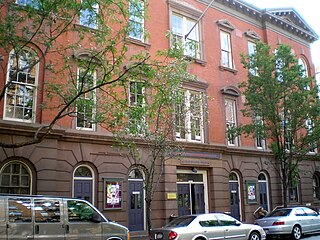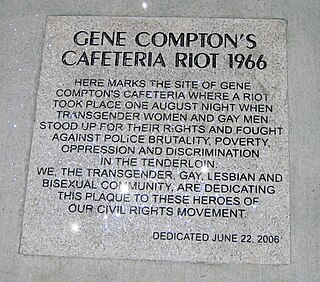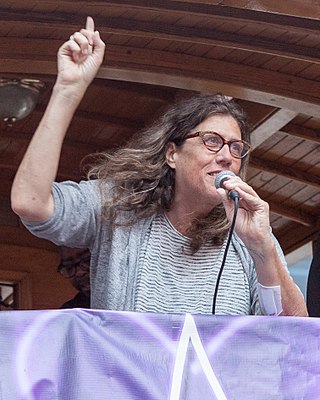
Lesbian, gay, bisexual, and transgender (LGBT) movements are social movements that advocate for LGBT people in society. Although there is not a primary or an overarching central organization that represents all LGBT people and their interests, numerous LGBT rights organizations are active worldwide. The first organization to promote LGBT rights was the Scientific-Humanitarian Committee, founded in 1897 in Berlin.

The homophile movement is a collective term for the main organisations and publications supporting and representing sexual minorities in the 1950s to 1960s around the world. The name comes from the term homophile, which was commonly used by these organisations. At least some of these organisations are considered to have been more cautious than both earlier and later LGBT organisations; in the U.S., the nationwide coalition of homophile groups disbanded after older members clashed with younger members who had become more radical after the Stonewall riots of 1969.

Gay Liberation Front (GLF) was the name of several gay liberation groups, the first of which was formed in New York City in 1969, immediately after the Stonewall riots. Similar organizations also formed in the UK, Australia and Canada. The GLF provided a voice for the newly-out and newly-radicalized gay community, and a meeting place for a number of activists who would go on to form other groups, such as the Gay Activists Alliance and Street Transvestite Action Revolutionaries (STAR) in the US. In the UK and Canada, activists also developed a platform for gay liberation and demonstrated for gay rights. Activists from both the US and UK groups would later go on to found or be active in groups including ACT UP, the Lesbian Avengers, Queer Nation, Sisters of Perpetual Indulgence, and Stonewall.

The gay liberation movement was a social and political movement of the late 1960s through the mid-1980s in the Western world, that urged lesbians and gay men to engage in radical direct action, and to counter societal shame with gay pride. In the feminist spirit of the personal being political, the most basic form of activism was an emphasis on coming out to family, friends, and colleagues, and living life as an openly lesbian or gay person.

Troy Deroy Perry Jr is an American cleric and the founder of the Metropolitan Community Church, with a ministry with the lesbian, gay, bisexual, and transgender communities, in Los Angeles on October 6, 1968.

Albert Cecil Williams is an American pastor, community leader, and author who is the pastor emeritus of Glide Memorial United Methodist Church.

The Lesbian, Gay, Bisexual & Transgender Community Center, commonly called The Center, is a nonprofit organization serving the lesbian, gay, bisexual and transgender (LGBT) population of New York City and nearby communities.

The Compton's Cafeteria riot occurred in August 1966 in the Tenderloin district of San Francisco. The riot was a response to the violent and constant police harassment of drag queens and trans people, particularly trans women. The incident was one of the first LGBT-related riots in United States history, preceding the more famous 1969 Stonewall riots in New York City. It marked the beginning of transgender activism in San Francisco.
Elliott R. Blackstone was a sergeant in the San Francisco Police Department, known as a longtime advocate for the lesbian, gay and transgender community in that city.

Glide Memorial Church is a nondenominational church in San Francisco, California, formerly a United Methodist Church congregation, which opened in 1930. Since the 1960s, it has served as a counter-culture rallying point, as one of the most prominently liberal churches in the United States. Located in the city's Tenderloin neighborhood, an area affected by drug addiction and homelessness, Glide is known for its social service programs, as well as the Glide Ensemble, its Gospel choir. The church building was listed on the National Register of Historic Places in 2022.

The Tenderloin is a neighborhood in downtown San Francisco, in the flatlands on the southern slope of Nob Hill, situated between the Union Square shopping district to the northeast and the Civic Center office district to the southwest. Encompassing about 50 square blocks, it is historically bounded on the north by Geary Street, on the east by Mason Street, on the south by Market Street and on the west by Van Ness Avenue. The northern boundary with Lower Nob Hill has historically been set at Geary Street.

Intersection for the Arts, established in 1965, is the oldest alternative non-profit art space in San Francisco, California. Intersection's reading series is the longest continuous reading series outside of an academic institution in the state of California.
LGBT movements in the United States comprise an interwoven history of lesbian, gay, bisexual, transgender and allied movements in the United States of America, beginning in the early 20th century and influential in achieving social progress for lesbian, gay, bisexual, transgender and transsexual people.
The history of LGBT residents in California, which includes centuries prior to the 20th, has become increasingly visible recently with the successes of the LGBT rights movement. In spite of the strong development of early LGBT villages in the state, pro-LGBT activists in California have campaigned against nearly 170 years of especially harsh prosecutions and punishments toward gays, lesbians, bisexuals, and transgender people.

Susan O'Neal Stryker is an American professor, historian, author, filmmaker, and theorist whose work focuses on gender and human sexuality. She is a professor of Gender and Women's Studies, former director of the Institute for LGBT Studies, and founder of the Transgender Studies Initiative at the University of Arizona, and is currently on leave while holding an appointment as Barbara Lee Distinguished Chair in Women's Leadership at Mills College. Stryker serves on the Advisory Council of METI and the Advisory Board of the Digital Transgender Archive. Stryker, who is a transgender woman, is the author of several books about LGBT history and culture. She is a leading scholar of transgender history.

Garden State Equality is a statewide advocacy and education organization in the U.S. state of New Jersey that advocates for lesbian, gay, bisexual, and transgender (LGBT) rights, including same-sex marriage.

The lesbian, gay, bisexual and transgender (LGBT) community in San Francisco is one of the largest and most prominent LGBT communities in the United States, and is one of the most important in the history of American LGBT rights and activism alongside New York City. The city itself has been described as "the original 'gay-friendly city'". LGBT culture is also active within companies that are based in Silicon Valley, which is located within the southern San Francisco Bay Area.

Felicia Elizondo was an American transgender woman with a long history of activism on behalf of the LGBT community. She was a regular at Gene Compton's Cafeteria in San Francisco during the time of the Compton's Cafeteria riot, a historic LGBT community uprising.
The Street Orphans were a gang of lesbian youth formed in Tenderloin, San Francisco. They participated in the Compton's Cafeteria Riot in 1966, and, along with the gay youth organization Vanguard, helped form San Francisco's chapters of the Gay Liberation Front and the Gay Activists Alliance.

Janetta Louise Johnson is an American transgender rights activist, human rights activist, prison abolitionist, and transgender woman. She is the Executive Director of the TGI Justice Project. She co-founded the non-profit TAJA's Coalition in 2015. Along with Honey Mahogany and Aria Sa'id, Johnson is a co-founder of The Transgender District, established in 2017. Johnson's work is primarily concerned about the rights and safety of incarcerated and formerly-incarcerated transgender and gender-non-conforming people. She believes that the abolition of police and the prison industrial complex will help support the safety of transgender people, and she identifies as an abolitionist.















